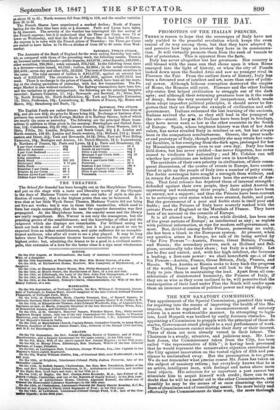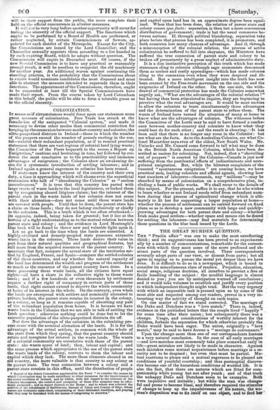THE NEW SANATORY COMMISSION.
THE appointment of the Special Commission, gazetted this week, for inquiring into the means of improving the health of the Me- tropolis, must be regarded as a recommencement of sanatory reform in a more workmanlike manner. In attempting to legis- late, Lord Moroeth was baulked by easily foreseen obstacles. In appointing a Commission to grapple with the principal of those ob- stacles, Government stand pledged to a real performance of work.
The Commissioners cannot mistake their duty or their interest. Three of them are men already versed in their labour. The Chairman is a steady, attentive, and judicious man. Mr. Lam- bert Jones, the Commissioner taken from the City, has been called "the representative of filth " ; it having been presumed that he would represent the conservative objection entertained in the City against innovation on the vested rights of filth and pes- tilence to undisturbed sway. But the presumption is too gross. We do not remember what precise course Mr. Jones has taken on the subject of sanatory reform ; but everybody knows that be is an active, intelligent man, with feelings and tastes above mere local objects. His selection for so important a post cannot but stimulate him to acquit himself with credit; there can be no doubt that he will be a useful aid to the other Commissioners, and possibly he may be the means of at once disarming the civic fears of cleanliness and of conciliating assent. The more boldly and effectually the Commissioners do their work, the more thorough
will be their support from the public, the more complete their hold on the official concurrence in ulterior measures.
It will not be very long before another opportunity will occur for testing the sincerity of the official support. The functions which ought to he performed by a Board of Health are performed, or rather neglected, by certain Commissioners of Sewers, ap- pointed for each district of the Metropolis. Except for the City, the Commissions are issued by the Lord Chancellor; and the Chancellor annually appoints them according to a list handed in by each expiring Board, which he adopts without question. The Commissions will expire in December next. Of course, if the new Special Commission is to have any practical or reasonably prompt result, it will be needless to reappoint the old machinery for another year. An additional reason against continuing the standing practice, is the probability that the Commissions about to expire would nominate candidates the most disposed and most able to obstruct the measure intended to supersede them in their functions. The appointment of the Commissions, therefore, ought to be suspended at least till the Special Commissioners have made their report. From the course taken by Lord Cottenham in this behalf, the public will be able to form a tolerable guess as to the official sincerity.



























 Previous page
Previous page